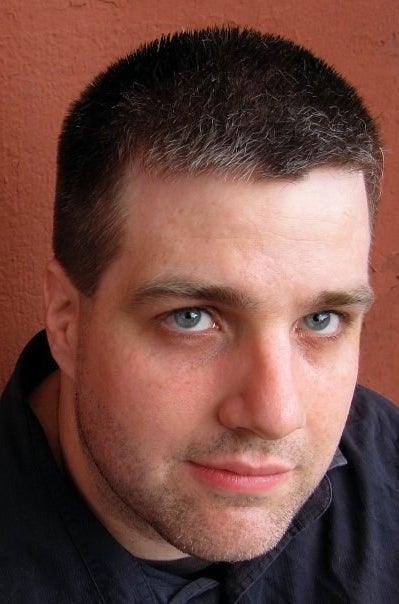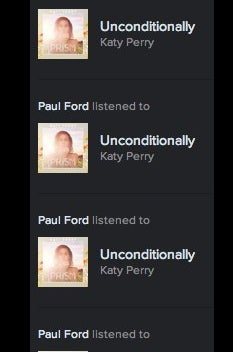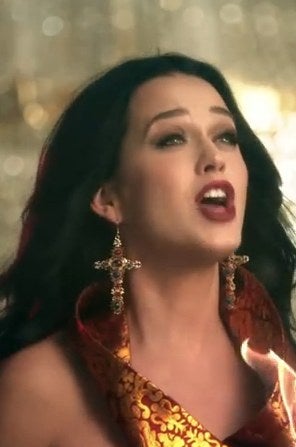


Welcome to "Defend Your List," a BuzzFeed FWD series where we ask internet humans to share and then defend their internet habits. Pretty much everything we do online is carefully tracked and categorized, meaning we all seem to have these naturally occurring lists full of our digital debris. Netflix queues. Amazon purchase histories. Browser histories. Recent Seamless orders. At first glance, they feel like random inputs, mundane details no one would be interested in. Viewed another way, though, they're some of the most telling expressions of one's true personality: your actual media diet.
Sometimes these lists can be a little embarrassing, as is the case with Paul Ford's Spotify history. His friend, blogger and entrepreneur Anil Dash, tweeted a screenshot to us revealing that Paul had been listening to the same Katy Perry song at least four times in a row. Paul is one of our favorite writers and programmers (OK, not totally true, we can't say for sure he's our favorite programmer), so we asked him to explain his saccharine listening habits.
The result is one of the most detailed defenses of repeated guilty pleasure listening that you will ever read. Enjoy.
Oh, and you can follow Paul on Spotify by clicking right here.
—The FWD Team
****
I've listened to Katy Perry's "Unconditionally" a few hundred or maybe a thousand times. The reason I was, and am, listening to this song on repeat is that I'm behind on a number of deadlines for articles and a book and I'm in a bad place — the best way to explain it is that I am waiting, impatiently, for my brain to work through whatever it needs to work through so that I can finally get my work done.
Everything feels a little like sandpaper, and I seek out smooth things to get me through the day. Katy Perry is a comfort, along with the RAC remix of "Hollywood" by Penguin Prison, "Elastic Heart" by Sia, The Weeknd, and Diplo, and a handful of other tracks that I can listen to for an entire day at a time on repeat without having any strong emotional reaction whatsoever.
Listening to music is now a weird social thing and I haven't bothered to turn off the sharing functions on Spotify. And for some reason when I listen to Katy Perry on Spotify it causes people to screenshot the listens and tease me on Facebook and Twitter. It's happened three or four times. No one else inspires this in the same way, not when I listened to "Return of the Mack C&J Street Mix" by Mark Morrison 50 times in a row. There's something about Katy Perry.
The song itself is pretty good; the lyrics, about unconditional love, are pretty typical of pop psychology ("did I almost see / what's really on the inside?" etc.). The first 36 seconds are perfectly produced, the musical equivalent of an expensive aluminum teapot you buy from Target; after 36 seconds it transforms into a glass pitcher you buy at Wal-Mart. But let's keep the focus on the first half-minute. I love the little reverbed drum tap that repeats on the fourth beat of the first 12 measures. It's gated in such a way that the reverb cuts off before the next measure starts, which is counterintuitive and unsettling. Your brain says: "Hey, someone is tapping a drum in a very echoey room," but then it cuts off and you realize that you've been had. But right as you're getting used to this weird reality you hear it again. Digital production! It gives the whole intro a kind of artificial, glassy feeling that I find comforting, like playing with magnets or biting a fancy pen.
You get four measures of that, along with a lot of little swirling produce-y chord-progression stuff, and then Perry comes in singing and is equally on-beat. She's the most expensive machine in the studio! Then the big drums come in, they kick up a ton, and Perry starts wailing. Look at the waveforms here:
That's a clip from the song where she goes "UN-CON-DITION-ION-ALLY." And it's a beast. Dynamics don't matter in this world. Things are quiet, they are loud, and there's not much in between. And there's a real logic to the new kind of production. Getting that really smooth intro sound and then the super-monster huge, sing-it-in-your-car chorus sound requires a lot of people working very hard on the same 3 minutes and 49 seconds of music over months. Here's what Wikipedia says about the construction of this song; it's safe to skim, but pretty fascinating if you read it closely:
Perry co-wrote "Unconditionally" with Dr. Luke, Max Martin, and Cirkut, all three of whom also handled production, instrumentation, and programming. It was recorded at MXM Studios in Stockholm, Sweden and Conway Recording Studios in Hollywood, California, with Perry handling the song's vocal production. Engineering was carried out by Peter Carlsson, Clint Gibbs, Sam Holland, and Michael Ilbert in March 2013 at Luke's In The Boo in Malibu, California and Secret Garden Studios in Montecito, California. Carlsson, Gibbs, Holland, and Ilbert were assisted by Eric Eylands, Rachael Findlen, Justin Fox, ANC Cory Bice. It was mixed by Serban Ghenea at MixStar Studios in Virginia Beach, Virginia, while John Hanes engineered the song for mix.
Which, whoa, whoa. That's a larger cast than Game of Thrones. And each of these people has secondary engineers, assistants, people who get coffee, people who book rooms, and people who make sure the right microphones are selected. So you're talking hundreds of people directly involved with the construction of this song over a period of months. Literally hundreds of thousands of individual choices and human desires flowed into the production of "Unconditionally," aside from the decisions made by Katy Perry. All involving huge amounts of money and risk too.
So in this case songcraft is a lot like architecture and general contracting, or software product development. And like any great product, it has to appeal very broadly, so Katy Perry traffics in yearnings and vague Platonic entities. In my current debased mental state I appreciate that. In my current state of mind I want my pop music to say as little as possible as perfectly as it can. And I love this about the song. For all of her publicized struggles in life, Katy Perry is not my job. As Sasha Frere-Jones wrote in the New Yorker: "We don't worry that Perry has lost herself to this cult or to that bad boyfriend, because she's never hidden the fact that she's not staking her life on her public persona."
But aside from Katy Perry not being much work for me as a listener, I also appreciate the craft of the thing itself. It keeps sinking in. Peter Gabriel was one of the people who nailed this sound in the mid-1980s, where everything in the studio is turned on one or two notches to make very big, warm, deep sound, anchored by Tony Levin's bass and about 5 million different percussionists who are all over the place but ultimately anchored 4/4. Melody gave way to this sound and it was pretty awesome, and I think it's still pretty awesome nearly 20 years on.
I think "Unconditionally" sounds a lot like "Secret World" off of Us, which is pretty much the perfect expression of the hyper-digital Peter Gabriel sound, especially in the drums on the live version (which don't truly kick in for many, many minutes). Of course even before that Gabriel was messing with this sound, back to his self-titled 1980 album (known as Melt), where he truly turned to the computer as the dominant studio instrument. By 1986 he'd figured out how to make absolutely monolithic pop songs using those production techniques, and he nails it with "In Your Eyes," one of those songs that is very special to everyone and inspires a key scene in a teen movie and a ton of really awkward acoustic covers.
"In Your Eyes" is specifically influenced by Afro-pop, to the point that Senegalese Afro-pop superstar Youssou-N'Dour appears on the track and toured with Gabriel doing the song. Gabriel is also on record as saying that it was a purposefully ambiguous song —that the object of the singer's adoration could be either a woman he loved, or God; that ambiguity was something that he borrowed from Afro-pop, along with the sound.
Then here's Katy Perry talking about "Unconditionally," again from Wikipedia: "I love this song because not only can it be a romantic, intimate song, but it can be about the type of love that a mother has when she sees her first child, or best friends or partners. ... It's a transcendent love, it's not just relationship status."
So there are all these amazing pop strands working out here: Dozens of people involved in production, the Peter Gabriel studio-magic drum sound, the ambiguous, vague lyrics. Of course the song has a video and I thought I'd look at that too.
Unfortunately this is where everything collapses. This is a pretty forgettable video; it's like they worked backward from the budget instead of forward from a vision. Katy Perry is dressed like if Salma Hayek worked at Gap. Her hair is dyed black instead of her natural blue, and the video is set in some weird comic book fancy-dress universe that Beyoncé would fire you for suggesting. That said, while it used to be that there was no accounting for popular taste, now there is: This video has been viewed nearly 100 million times. I guess this is what happens if people don't read. In conclusion, there is an owl in the video.
But wait, one thing sticks out: The producers of this video want us to notice that men are dancing with one another and there is multiracial dancing. The idea being, perhaps, that unconditional love knows no limits, no boundaries. Do you remember Christina Aguilera's "Beautiful"? That was a song about unconditional self-love, and it had a video that was completely unacceptable and yet totally amazing. If you haven't read it, the casting call for that video, where the director listed what they needed, is one of the best things ever written. Here's a taste:
STREET HOOKER: 27–40, all ethnicities — She has fallen on hard times (duh, she's a hooker). Once very beautiful, her looks have become somewhat worn and faded.
WHITE-TRASH SHOP FEMALE CLERK: 40–55, Caucasian, not a caricature, not comedy ... think Gumma or Bulb ... works at a truck stop ... from the "armpit" of Florida, so to speak....
LESBIAN WOMEN: 40s, all ethnicities ... should appear instantly "feminist" ... I know not all feminists are lesbian, TRULY I DO ... but do you get what we're going for here? Thanks! Strong actors a must!!
So that's a disaster. And here's the video itself:
Despite having a casting call that would have literally caused Twitter to burst into flames had it been released today, "Beautiful" generated an enormous pop moment. And "Unconditionally," in its theme and video, is trying for the same thing, mixing up all of the past pop moments in terms of production, performance, and putting this amazing gloss on it, smoothing out every possible rough edge so that it goes smoothly down the gullet of every possible global pop consumer and makes everyone (more) rich and (more) famous. So all of this is why I listened to Katy Perry on repeat, and why I didn't feel much shame about it. You can wilfully deny that we live in a pop-fuelled mass media technoculture, or you could listen to "Unconditionally." I've made my choice.
I find it ridiculous when people on Twitter mock me about listening to Katy Perry. I mean, it's funny, I'm up for it, I like the attention. But it's also a weird kind of tribal thinking where what you listen to somehow indicates some larger meaning, and that doesn't seem to be relevant any more, not since you could listen to or watch just about anything all the time for a cost approaching free.
It's also pretty funny to me that my BuzzFeed peeps would mock me out on this because this is exactly the criticism BuzzFeed comes in for from the larger media — this sense that it's somehow less legit because it doesn't religiously follow the models of older, more "established" media, that its relentless engagement with pop and internet culture makes it somehow less legitimate. I mean if any organization has been tasked to defend its list, it's you. What I'm saying is there is no list to defend, and I wonder if maybe we'd all be happier if we stopped thinking in lists at all.
****
Read last week's "Defend Your List" with Jenna Wortham.


